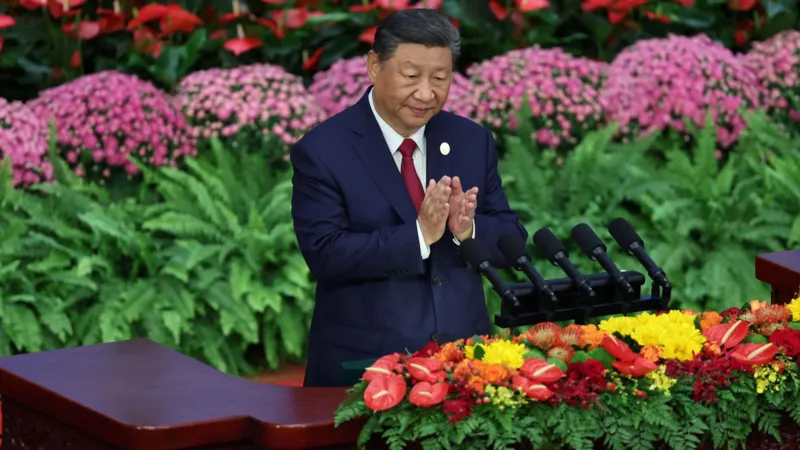In recent years, global attention to sustainability has intensified, with countries and corporations alike recognizing the urgent need to combat climate change and protect the environment. China, the world’s largest emitter of greenhouse gases, has been at the center of this global conversation. In a surprising and strategic shift,China is now leading the way in promoting green initiatives, particularly in Africa, a continent rich in natural resources but historically burdened with environmental challenges. This shift marks a significant evolution in China’s approach to international partnerships, signaling a new era of sustainable development in Africa.
China’s Historical Involvement in Africa
China’s involvement in Africa goes back decades, with the country investing heavily in infrastructure, mining and energy projects across the continent. Historically, this investment has been driven by China’s need for resources to fuel its rapid economic growth. Roads, railways and ports have been built facilitating the extraction and export of Africa’s natural resources. While these projects have undoubtedly contributed to economic growth in Africa, they have also been criticized for their environmental impact, often leading to deforestation, pollution and habitat destruction.
The Green Shift: A New Focus on Sustainability
In recent years, however, China has begun to pivot toward a more sustainable approach in its dealings with Africa. This shift is not only a reflection of global trends, but also China’s recognition that sustainable development is vital to long-term economic stability. The Chinese government has committed to achieving carbon neutrality by 2060, and this commitment is now influencing its international policies, including in Africa.
One of the key areas where this shift is evident is in the energy sector. China has been a key player in the development of renewable energy projects across Africa. Chinese-funded solar, wind and hydropower projects are booming, providing clean and affordable energy to millions of Africans.For example, the Benban Solar Park in Egypt, one of the largest solar parks in the world, is heavily supported by Chinese investment. Similarly, China’s involvement in the construction of hydropower plants in Ethiopia and Uganda is helping to reduce fossil fuel dependence in these countries.
Environmental protection and conservation of biodiversity
Apart from energy, China is also engaged in initiatives for environmental protection and biodiversity conservation in Africa. The Belt and Road Initiative (BRI), often criticized for its environmental impact, is undergoing a green transformation. China has introduced the concept of “Green BRI”, which emphasizes sustainable practices in its infrastructure projects. In Africa, this means a greater focus on environmental assessments, adopting green technologies, and promoting projects that do not harm local ecosystems.
For example, in Kenya, China is involved in the construction of the Nairobi Expressway, a project that incorporates green practices such as tree planting along the highway and noise barriers to protect wildlife. Use of Additionally, Chinese companies are now engaging more frequently with local communities to ensure that their projects meet environmental and social standards.
Challenges and criticisms
While China’s green transition in Africa is promising, it is not without challenges. Critics say some of China’s green projects still focus more on optics than real environmental benefits. For example, while China has invested in renewable energy projects, it has also continued to support coal-fired power plants in some African countries, furthering its sustainability agenda. Questions arise.
Moreover, there are concerns about the transparency of China’s environmental initiatives in Africa. Some projects have been criticized for not carrying out adequate environmental impact assessments, and there are fears that the push for green development could be used to mask other less sustainable activities. Addressing these concerns requires greater transparency and accountability for investment by both the Chinese government and African governments.
The role of African nations
The success of China’s green shift in Africa also depends on the role of African countries themselves. While Chinese investment is important, African countries must take ownership of their own sustainability agendas. This means setting clear environmental policies, enforcing regulations, and ensuring that foreign investment is aligned with national development goals.Some African countries, such as South Africa and Morocco, have already made significant progress in developing their renewable energy sectors, often with Chinese support. However, more needs to be done to ensure that these efforts are part of a broader strategy for sustainable development across the continent.
The future of China-Africa relations
China’s strategic shift toward sustainability in Africa is still in its early stages, but the potential impact is significant. If successfully implemented, this Green Revolution could change the trajectory of Africa’s development, giving the continent the tools it needs to tackle environmental challenges while boosting economic growth.For China, the shift represents an opportunity to reposition itself as a leader in global sustainability, countering some of the criticism it has faced in the past.
However, the road ahead is not without obstacles. Both China and Africa must explore the complexities of balancing economic growth with environmental protection. The success of this green revolution depends on both parties prioritizing sustainability over short-term gains and working together in a transparent and accountable manner.
Conclusion
Finally, China’s strategic shift towards sustainability in Africa marks a new chapter in the relationship between the two regions. This Green Revolution, which focuses on renewable energy projects, environmental protection initiatives, and long-term development, has the potential to reshape the future and position of Africa. However, to realize this vision, both China and Africa must commit to a truly sustainable partnership, one that prioritizes economic growth as well as the health of the planet.
Inspired by bbc news and read more Article Here
